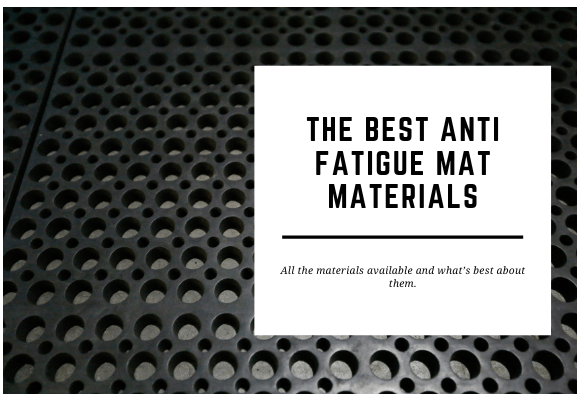
Anti Fatigue Mat Material: which is best?
All the materials available and what’s best about them.
If you’re looking for an anti fatigue mat, you might be wondering which material is best. There are a few different options of anti fatigue mat material, and it can be confusing knowing which one will suit your needs best.
As always, we want to help you find the perfect mat, and the best way to do that is by giving you all the information you need to make an informed decision.
So, what is the best material for an anti fatigue mat?
What makes a good anti fatigue mat?
There are two things that a great anti fatigue mat needs to provide: flexibility and support.
Flexibility
The reason your feet get tired from standing on hard floors all day is that your muscles are being pushed into one position. Humans naturally move around, even when standing still. On a natural floor, our muscles are constantly moving to keep us upright and balanced.
On a solid floor, however, this natural flexing is impossible, so our muscles start to cramp up and hurt. Our bones are also not meant to be jammed into each other, so the compression on our joints is also responsible for our pain.
It isn’t just muscle and joint pain that flexible anti fatigue mats reduce. Circulation depends on our blood vessels being wide and unrestricted, which is only possible if we are moving around.
Support
While flexibility is key for any anti fatigue mat material, too much would make us fall over. The best mats strike a balance that offers enough support to keep us upright while still allowing our muscles to make micro-movements.
Some applications require more support than others. Warehouses, for example, might need anti fatigue matting to support wheeled traffic along with humans. The best mats for these cases are ones that have a durable and supportive design.
For more information on the effectiveness of anti fatigue mats, check out this article evaluating anti fatigue mat studies.
Best anti fatigue mat materials
Rubber
Best for: industrial applications
Rubber is by far the most common and popular material for anti fatigue mats, and for good reason. It’s strong, durable, flexible and a cost-effective option. It is also very convenient to clean, with some types having grease and oil resistant properties.
Rubber is perfect for providing full support while also flexing to allow the tiny muscle fibres to do their thing. It also offers the most diverse range of additional features – such as holes for liquid drainage, grease and chemical resistance and suction cups to reduce slip accidents.
Foam
Best for: offices
This is an interesting one because some foam is technically rubber. Most of the foam used in our anti fatigue matting is made from polyurethane, and it is one of the most comfortable options.
Foam offers the most comfort of any mat material, but it does not offer the stability and support that some industrial applications might need. Foam anti fatigue mats are ideal in an office environment, where individuals are standing at a desk all day.
Carpet
Best for: homes and commercial buildings
Carpet has not been tested for anti fatigue properties in itself but does come as the top layer of a rubber- or foam-backed anti fatigue mat. Carpet is absorbent, comfortable and hides dirt well, so works well for anti fatigue matting in inside areas.
Carpet is a great option for client- and customer-facing buildings, where style is a priority. It’s easy to clean with a vacuum, which is great for homes, but it can’t be used in outside or wet areas.
The best anti fatigue mat material: rubber!
Our favourite choice of material for an anti fatigue mat is rubber. While foam does give you that little bit of extra comfort, it is too thick and unstable for everyday use in high-traffic areas.
If you are looking for something super supportive that comes with a bunch of other features, rubber might be your best bet.
For a personalised suggestion or to get more advice from the matxperts, get in touch using the chat function below. Alternatively, browse the website or give us a call on 1300 628 746.

